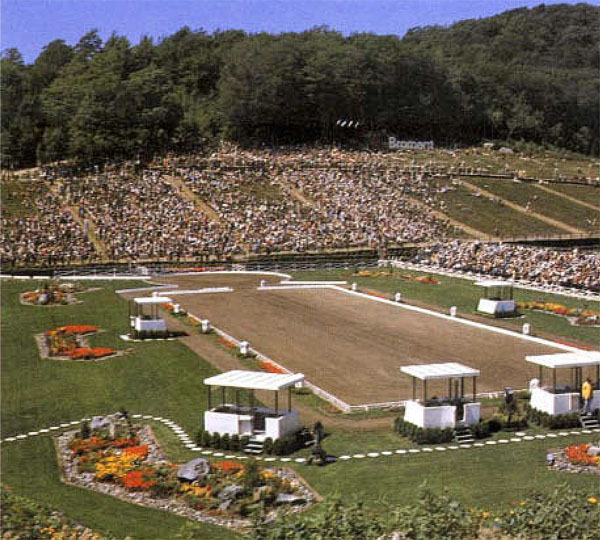“Pressing” Need Cited in FEI Report to Fix World Equestrian Games Beginning with Bromont in 2018
10 years ago StraightArrow Comments Off on “Pressing” Need Cited in FEI Report to Fix World Equestrian Games Beginning with Bromont in 2018

April 23, 2015
Admitting a “pressing” need to make changes to the 2018 World Equestrian Games in Bromont, Canada as a first step in overhauling the flagship of international horse sports, a report specially commissioned for the FEI calls for downsizing the event held once every four years to make it affordable to stage.
The report cited the 2010 Games in Lexington, Kentucky which had to be subsidized by the FEI because it did not attract enough paying spectators and widespread problems with the 2014 Games in Normandy as reasons for the need to make changes. The complete report is available at: WEG Strategic Review.
The report to the International Equestrian Federation was prepared by the London-based Sports Consultancy for debate at the FEI Sports Forum in Lausanne, Switzerland next Monday and Tuesday on the future of the WEG and the Olympic sports of dressage, eventing and jumping.
Much change is needed, according to the report, “to create a sustainable and attractive event format, but it is clear there is a significant appetite for change. All consultees were engaged and enthusiastic about this process; all are invested in the success of the Event and want it to remain.
“Many believe that now is the time for the format to change and are excited about the opportunity. Stakeholders also indicated that this change needs to happen. No sport can take its IOC status for granted and the FEI must demonstrate that they are modernizing the sport and meeting their stakeholders’ expectations.
“This report was commissioned with the bidding process for the 2022 edition of the FEI World Equestrian Games in mind.
“However, the challenges faced by Normandy indicate that the need for change is more pressing.
“Consequently, this report highlights changes that could be made to the 2018 edition, subject to discussion with the organizers.
“The FEI World Equestrian Games in Bromont in 2018 will undoubtedly be smaller–fewer horses will travel from Europe due to the costs associated. Additionally, the proposed venue set-up is considerably more compact. However, the problems highlighted in Normandy should not be forgotten and changes to the format should be proactively made.\
“The innovations introduced for WEG will impact other FEI events. Therefore, if changes are made to the format of this event, further work will need to be completed to ensure these changes are implemented consistently throughout other equestrian events and that the impact is managed.”
Bromont was the site of the 1976 Olympic equestrian events but is best known as a winter resort, 54 miles (87km) and at least an hour outside Montreal. Transportation to and from the venue to hotels in Montreal is considered a major issue in addition to lack of permanent infrastructure capable of handling large numbers of participants and spectators at the venue.
The WEG was inaugurated in Stockholm in 1990 as the showcase of the six horse sports of dressage, driving, endurance, eventing, jumping and vaulting governed by the FEI at the time. The Games were rated a success but four years later, the WEG at The Hague was both a financial and organizational disaster. The 1998 Games had to be moved from Dublin to Rome when a prime sponsor dropped out a year before the event, but the event of five sports–endurance was held in Abu Dahbi–was successful.
Reining was added to the 2002 WEG in Jerez, Spain that was also regarded as successful though the governments incurred debt that took several years to pay off.
The 2006 Games in Aachen, Germany at the long established World Equestrian Festival CHIO venue that was expanded for the WEG were a spectacular success–576,000 spectators, global media coverage and virtually seamless organization in preparation and implementation.
Para-equestrian was added to the 2010 WEG, making a total of eight disciplines and the first time outside Europe when staged at the Kentucky Horse Park in Lexington. The Games were marked by extremely hight hotel and ticket prices, low quality food for spectators and the media, poor organization and not enough spectators to help cover costs that the FEI had to subsidize the event.
The same schedule of eight disciplines made up the 2014 Games in Normandy, located far apart with inadequate preparation, substandard accommodations for grooms and athletes at some, vendors in a separate area from the sports action and generally poor organization that triggered widespread complaints.

